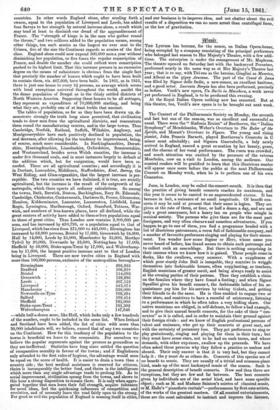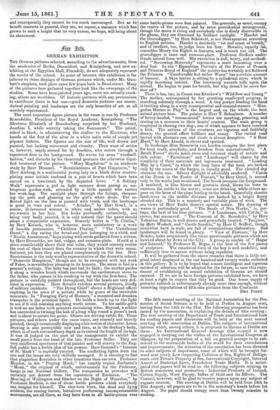June, in London, may be called the concert-month. It is
then that the practice of giving benefit concerts reaches its maximum, and this year it seems to be carried to an unprecedented excess. It has become in fact, a nuisance of no small magnitude. Of benefit con- certs it may be said at present that their name is legion. They are given at the rate of three, or four, or half a dozen a day, and are not only a great annoyance, but a heavy tax on people who mingle in musical society. The persons who give them are for the most part foreigners, and very often obscure and nameless adventurers. If you happen to go to one of them, you find a programme headed with a list of illustrious patronesses, a room full of fashionable company, and a number of favourite performers singing and playing for their amuse- ment. You wonder how some Signor or Herr, whose name you never heard of before, has found means to obtain such patronage and to collect such an assemblage. But there is nothing surprising in their success when we know how it is gained. These people come in flocks, like the swallows, every summer. With a suppleness of which poor sturdy John Bull is incapable, they contrive to wriggle themselves into 'fashionable houses, often supplanting, as teachers, English musicians of greater merit, and being always ready to assist at the evening parties of their patrons. Thus they establish a claim on the families where they have found a footing; and when Signor Squallini gives his benefit concert, the fashionable ladies of his ac- quaintance pay him for his services by taking tickets, and getting their friends to do the same. He is thus enabled to engage two or three stars, and contrives to have a roomful of aristocracy, listening to a performance in which he often takes a very trifling share. Our native musicians are obliged, in self-defence, to follow a bad example, and to give their annual benefit concerts, for the sake of their "con- nexion" as it is called, and in order to maintain their ground against their foreign rivals : and we know of English professional persons of talent and eminence, who get up their concerts at great cost, and with the certainty of pecuniary loss. They get performers to sing or play gratuitously, singing and playing for them in their turn; but they must have some stars, not to be had on such terms, and whose demands, with other expenses, swallow up the proceeds. We have often asked these persons why they follow a practice so useless and absurd. Their only answer is that it is very bad, but they cannot help it : they must do as others do. Concerts of this species are of no benefit to music. They are usually of a trivial and common-place kind, made up of the most hackneyed music of the season. Such is the general description of benefit concerts. Now and then there are exceptions, but they are few and far between. The best concerts given by individuals are of the serial kind, and have some specific object; such as M. and Madame Sainton's soirees of classical music, or M. Halle's " pianoforte recitals"—performances by first-rate artists, of the works of the greatest masters. Of all musical entertainments, these are the most calculated to instruct and improve the listener, and consequently they cannot be too much encouraged. But as to benefit concerts in general, they are, we repeat, a nuisance which has grown to such a height that its very excess, we hope, will bring about its abatement.































 Previous page
Previous page